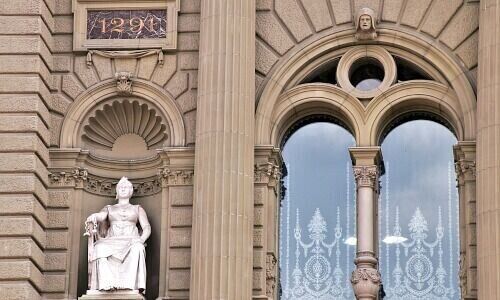Whether or not frozen assets can be confiscated and used for reconstruction in Ukraine has kept Swiss politicians occupied. A review offers clarity.
The Swiss Federal Council commissioned a working group headed by the Federal Office of Justice (FOJ) to examine the legal issues surrounding the frozen assets of sanctioned individuals and organizations from Russia.
The legal experts came to the unequivocal conclusion the confiscation of private Russian assets violates the federal constitution as well as the applicable legal system and violates Switzerland's international obligations, according to a statement Wednesday. The expropriation without compensation of private property of lawful origin is not permissible under Swiss law.
The Federal Council took note of the analysis at its February 15 meeting. The working group, headed by the FOJ, also included representatives of the State Secretariat for Economic Affairs (Seco), the State Secretariat for International Financial Matters (SIF), and the Directorate of International Law (DIL).
International Discussions
In international circles, the possibility of confiscating the reserves of the central bank of Russia and state assets remains under discussion. In addition, the imposition of tougher criminal penalties for violating sanctions is also under discussion. This has been an important topic in Switzerland since it largely adopted the sanctions the European Union imposed against Russia.
The government is closely following the proposals and also lends its voice to the discussions with the relevant authorities keeping the federal council informed.
Continued Aid to Ukraine
The statement acknowledged that with its attack on Ukraine, Russia has violated international law and is fundamentally obliged to make reparations for damage caused in Ukraine. Regardless of the discussions about frozen assets, the Swiss government will continue to support Ukraine, and the issue of reparations and support are independent of each other.
The clarification of the legal issues was commissioned against the background of international discussions and several parliamentary initiatives.
This involved those funds that are currently frozen in Switzerland due to the sanctions against Russia. According to the latest information from the FSO, assets with links to Russia and Belarus in Switzerland amount to more than 7.5 billion Swiss francs, and 15 properties are frozen.



































